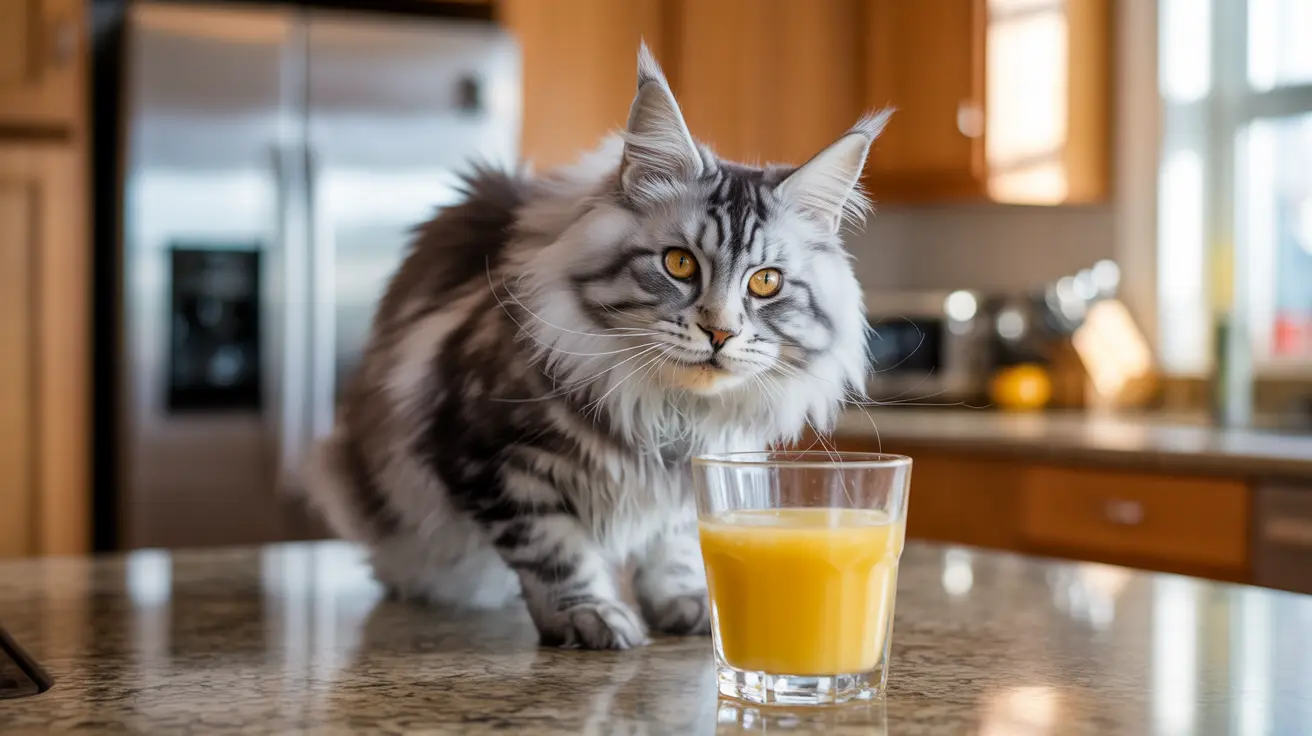Why Orange Juice is Dangerous for Cats
Cats face several serious health risks from orange juice consumption, primarily due to toxic compounds naturally present in citrus fruits:
Essential Oils and Toxic Compounds
Orange juice contains essential oils like limonene and linalool, which are particularly dangerous for cats. Unlike humans, cats lack specific liver enzymes needed to process these compounds safely, making them especially vulnerable to citrus toxicity.
Citric Acid Concerns
The high concentration of citric acid in orange juice can severely irritate a cat's digestive system, leading to immediate gastrointestinal distress and potential long-term complications.
Signs of Orange Juice Toxicity in Cats
If your cat consumes orange juice, watch for these warning signs:
- Excessive drooling
- Vomiting and diarrhea
- Weakness or lethargy
- Muscle tremors
- Difficulty breathing
- Depression
- Skin irritation or allergic reactions
The Nutritional Reality: Why Cats Don't Need Orange Juice
Cats are obligate carnivores, which means their bodies are designed to derive nutrition exclusively from animal-based proteins. Orange juice offers no nutritional benefits to cats and can actually be harmful for several reasons:
Natural Vitamin C Production
Unlike humans, cats naturally produce their own vitamin C, making supplementation through orange juice unnecessary and potentially dangerous.
Sugar Content Risks
The high sugar content in orange juice can contribute to feline obesity, diabetes, and dental problems, creating additional health concerns beyond toxicity.
What to Do If Your Cat Drinks Orange Juice
Immediate Steps
If your cat has consumed orange juice, take these actions:
- Remove any remaining orange juice
- Monitor your cat closely for symptoms
- Contact your veterinarian if symptoms develop
- Document how much juice was consumed
- Keep any product packaging for reference
When to Seek Emergency Care
Seek immediate veterinary attention if your cat shows severe symptoms or has consumed large quantities of orange juice or any citrus products.
Frequently Asked Questions
Can cats safely drink orange juice or other citrus juices?
No, cats cannot safely drink orange juice or any citrus juices. These beverages contain compounds toxic to cats and should be strictly avoided.
What are the symptoms if my cat accidentally drinks orange juice?
Common symptoms include vomiting, drooling, diarrhea, weakness, muscle tremors, and breathing difficulties. The severity depends on the amount consumed.
Why is orange juice toxic to cats?
Orange juice contains essential oils (limonene and linalool), citric acid, and psoralens that cats cannot properly metabolize, making these compounds toxic to their systems.
Are there any health benefits for cats from drinking orange juice?
No, there are absolutely no health benefits for cats from drinking orange juice. Cats produce their own vitamin C and cannot utilize nutrients from citrus fruits.
What should I do if my cat eats orange peel or drinks a lot of orange juice?
Contact your veterinarian immediately. Bring any packaging or samples of what was consumed, and watch for symptoms of citrus poisoning. This situation requires professional medical attention.
Conclusion
Orange juice poses significant health risks to cats with no nutritional benefits. As responsible pet owners, it's crucial to keep all citrus products away from our feline companions and stick to veterinarian-approved foods and treats. If you're ever unsure about a food's safety for your cat, always consult with your veterinarian before offering it.






